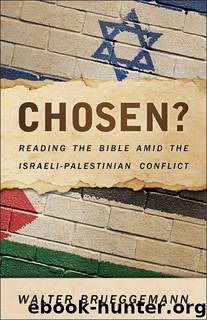Chosen?: Reading the Bible Amid the Israeli-Palestinian Conflict by Walter Brueggemann

Author:Walter Brueggemann [Brueggemann, Walter]
Language: eng
Format: azw3, epub
ISBN: 9781611646122
Publisher: Westminster John Knox Press
Published: 2015-09-01T16:00:00+00:00
Thus, when we “cross the Jordan” from the Torah into the account of the land entry in Joshua 3–4, we are in a very different world of land acquisition. Now the land is not “promised” or “given”; it is taken by force of arms. Thus, Joshua 12:7–24 can provide an inventory of the “thirty-one kings” who were defeated by Israel. That list, moreover, is supported by earlier narratives of brutal fighting and victory for Israel. The later story of land-taking, unlike the Torah’s story of land promise, pivots on the recognition that the land of promise was not empty. It was a land fully and long occupied by those who had preceded Israel.
The several narratives of Joshua tell of a variety of ways in which the arriving Israelites come to terms with the resident population, terms that characteristically end with triumph for and control by the Israelites. The summary statement of the book of Joshua links the victory of Israel to the preceding land promises, making clear that the actual victories were a “performance” of God’s promises:
Thus the Lord gave to Israel all the land that he swore to their ancestors that he would give them; and having taken possession of it, they settled there. And the Lord gave them rest on every side just as he had sworn to their ancestors; not one of all their enemies had withstood them, for the Lord had given all their enemies into their hands. Not one of all the good promises that the Lord had made to the house of Israel had failed; all came to pass. (Josh. 21:43–45)
God’s promises were fulfilled, but only through the vigorous action of Israel. It is more than a little ironic (an exhibit of the same recurring tension) that this fulsome statement of promise fulfilled is promptly matched by a warning that reiterates the Deuteronomic if:
If you transgress the covenant of the Lord your God, which he enjoined on you, and go and serve other gods and bow down to them, then the anger of the Lord will be kindled against you, and you shall perish quickly from the good land that he has given to you. (Josh. 23:16)
Thus, the land is given, the land is taken, and the land is losable.
It turned out that the narrative of the losability of the land, a view championed by the prophets, was correct. The land was lost! The city of Jerusalem was destroyed. According to Jeremiah’s narrative report, “Judah went into exile out of the land” (52:27).
The small number of deportees in Jeremiah 52:8–10 suggests that many remained in the land; the elite opinion-makers were deported, however, and it is their story that the Bible tells. The triumphant tone of Israel had turned to grief as Israel sensed divine abandonment:
But now you have spurned and rejected him [the king];
you are full of wrath against your anointed.
You have renounced the covenant with your servant;
you have defiled his crown in the dust.
You have broken through all his walls;
you have laid his strongholds in ruins.
Download
Chosen?: Reading the Bible Amid the Israeli-Palestinian Conflict by Walter Brueggemann.epub
This site does not store any files on its server. We only index and link to content provided by other sites. Please contact the content providers to delete copyright contents if any and email us, we'll remove relevant links or contents immediately.
| Arms Control | Diplomacy |
| Security | Trades & Tariffs |
| Treaties | African |
| Asian | Australian & Oceanian |
| Canadian | Caribbean & Latin American |
| European | Middle Eastern |
| Russian & Former Soviet Union |
The Secret History by Donna Tartt(19053)
The Social Justice Warrior Handbook by Lisa De Pasquale(12187)
Thirteen Reasons Why by Jay Asher(8894)
This Is How You Lose Her by Junot Diaz(6877)
Weapons of Math Destruction by Cathy O'Neil(6267)
Zero to One by Peter Thiel(5787)
Beartown by Fredrik Backman(5737)
The Myth of the Strong Leader by Archie Brown(5500)
The Fire Next Time by James Baldwin(5431)
How Democracies Die by Steven Levitsky & Daniel Ziblatt(5216)
Promise Me, Dad by Joe Biden(5144)
Stone's Rules by Roger Stone(5081)
A Higher Loyalty: Truth, Lies, and Leadership by James Comey(4954)
100 Deadly Skills by Clint Emerson(4921)
Rise and Kill First by Ronen Bergman(4780)
Secrecy World by Jake Bernstein(4741)
The David Icke Guide to the Global Conspiracy (and how to end it) by David Icke(4709)
The Farm by Tom Rob Smith(4502)
The Doomsday Machine by Daniel Ellsberg(4484)
